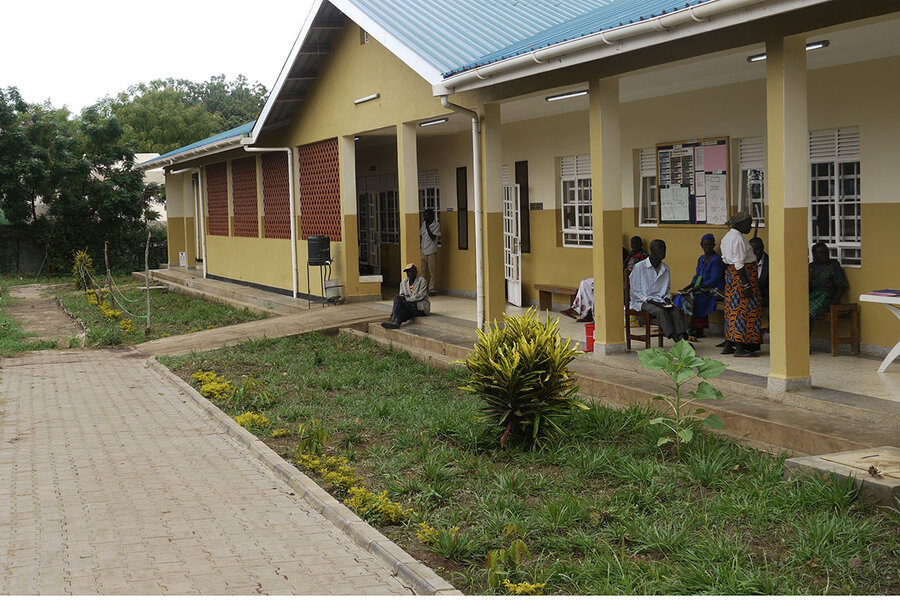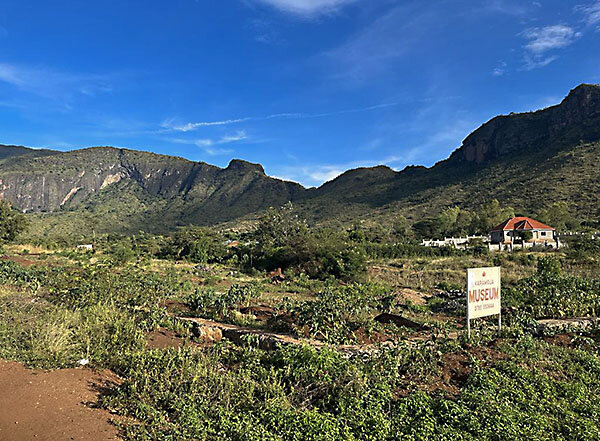African eye doctor looks on the bright side
Loading...
| MOROTO, UGANDA
A few hours past midday, and Gladys Atto has already performed five surgeries. Another six are scheduled before evening. Work is relentless for the first and only ophthalmologist in Karamoja, in northeastern Uganda.
When she arrived five years ago, the eye care unit was just two rooms. Specialty equipment was gathering dust; staff had not yet been trained on how to use it. Now, nurses bustle between brightly painted rooms, gently removing bandages to check recently restored vision. Visitors often travel hundreds of miles to reach the clinic, where treatment is free of charge.
Why We Wrote This
A story focused onAmid patchy health care in many African states, sometimes one determined individual can make all the difference.
Dr. Atto estimates that she has treated at least 7,000 people. In her limited spare time, she visits schools to encourage girls to enter the medical profession.
Support for eye care is limited in Uganda’s meager health care budget, with only around 40 practicing eye doctors in the country.
Dr. Atto is slowly gaining recognition for her efforts. Last year, she won a Doctor of the Year award in Uganda.
On her rounds she wears red lipstick and colorful beads, giving patients something exciting to see as soon as she restores their sight. She hopes the future of eye care in her country will be equally bright.
Gladys Atto settles into a chair in her sparsely furnished office and rests her feet for a moment. It is only a few hours past midday; she is tired, but there is little time to relax. Already today, the young ophthalmologist has removed cataracts from five patients’ eyes so they can see again.
Another six surgeries are scheduled before evening.
Dr. Atto is the first and only ophthalmologist in Karamoja, a remote region the size of Belgium in the northeastern corner of Uganda. For the nearly 1.2 million people who live here, life is ruled by extremes. The climate is harsh; the sun hot. Rain rarely falls, making it hard to grow enough crops.
Why We Wrote This
A story focused onAmid patchy health care in many African states, sometimes one determined individual can make all the difference.
During the long dry periods, nomadic Karamojong pastoralists migrate over the scorched earth with their cows, searching for grass and water. In 2019, the region was hit hard by a surge of cattle rustling. Armed raiders roamed among thorny livestock pens and stole animals from their neighbors, hoping thefts would bring in the money they needed to survive.
In these rugged areas, access to Western-style health care is rare. The hospital where Dr. Atto works is one of just five in the extensive region, and the only one capable of providing specialized services. Travel is difficult, but especially so for those who are unwell: Long distances are traveled on foot along rough dirt roads, or in crowded public cars. The care Dr. Atto provides is free of charge, but the cost of transport is out of reach for many in Karamoja, which is Uganda’s poorest region.
“They are resilient,” Dr. Atto says of the community she serves. “That is all I can say.”
Sight restored, lives reclaimed
Dr. Atto learned her own tenacity at a young age, growing up during the government’s conflict with the Lord’s Resistance Army in northern Uganda. Over the course of some three decades, Joseph Kony recruited thousands of child soldiers to serve in his fearsome guerrilla group.
“That time was a scary moment, but I believe that it built me up,” she recalls. “We’d be sleeping ... and Mom would say, ‘Come down; go under the bed.’ You did not know how close or far the bullets were.”
As a child, Dr. Atto knew that she wanted to be a doctor. She loved science, and hoped to do some good in the world.
Interning as a doctor in her home city of Gulu, she saw how few eye specialists there were in Uganda. Without a permanent ophthalmologist in the public hospital, patients seeking care were sent away until a specialist from Kampala, the country’s capital, could visit and offer eye care.
Dr. Atto wanted to help other places and people facing similar challenges. A telephone conversation during her studies with the director of a hospital in Karamoja revealed that there had never been an eye doctor permanently posted there.
She offered her services full time. The director accepted.
It worried her mother, and her friends, who wanted her to stay closer to home.
“When you mention Karamoja, everyone thinks you are cut off,” she says. “People see this place as very remote. Some were thinking I’d made a terrible decision.”
Undeterred, Dr. Atto loaded everything she owned into a truck and made the 12-hour journey to her new posting.
“The only thing that worried me about working here was if I didn’t get good accommodation,” she jokes, with characteristic good humor. “Put me in the deepest village. Give me good housing, and everything else can wait.”
When she arrived five years ago, the eye care unit was just two rooms. There was nowhere for patients to recover, so they often took to sleeping in the grassy courtyard. Specialty equipment was gathering dust; staff had not yet been trained on how to use it.
An international nongovernmental organization, Sight Savers, stepped in to sponsor Dr. Atto’s work in Karamoja. It also helped in the construction of a new eye clinic, which was completed in 2020, and trained half a dozen staff members.
Now, the walls are painted the color of sunshine, adorned with vision tests and notices about eye health. Nurses in clean white uniforms bustle from patient to patient, gently removing bandages to check recently restored vision.
Ensuring these patients can see again is Susan Niyigena’s favorite part of her job. “The eyes are the window to the beautiful things which are in the world. The environment, the people,” says Ms. Niyigena, who is a nurse specializing in eye care.
It is hard to keep track, but Dr. Atto estimates that she has treated at least 7,000 people.
Sight is vital to the livelihoods of farmers and pastoralists in Karamoja, so Dr. Atto and her team run mobile eye clinics, traveling to rural villages. Hot wind whirls red dust into the air as they meet patients who cannot make it to the hospital in Moroto.
“I have seen people’s lives being given back to them,” says Juliet Sentongo Busobozi, who manages programs for Sight Savers.
Whenever she can on these trips, Dr. Atto focuses on women, who bear the brunt of feeding and caring for their families. “If you want an improvement in any area of life, economically, socially, everything, a woman needs to be able to see,” Dr. Atto says.
In her limited spare time, the doctor visits schools to encourage girls to take jobs in medicine themselves.
A bright future
But with progress comes pressure, and Dr. Atto often wonders if she is doing enough. She frets about leaving the hospital, knowing patients in emergency situations might not receive the care they need as she is the only eye surgeon there is.
Funds for eye care are limited in Uganda’s already-meager health care budget, says Dr. Denis Erima, president of the Ophthalmology Society of Uganda. And of the 40 practicing eye doctors in Uganda, the majority are clustered in the capital city, Kampala.
Still, Dr. Atto is slowly gaining recognition for her efforts. Last year, she was nominated for a Doctor of the Year award in Uganda. In November, she won.
She celebrated with her staff, going out for a meal and sharing a cake. But she appears most comfortable at the hospital, free from pomp and hard at work. On her rounds she wears red lipstick and colorful beads, giving patients something exciting to see as soon as she restores their sight.
She hopes the future of eye care in her country will be equally bright.
“I still dream that one day we will achieve universal eye health, the state where everyone, anywhere, anytime, can get the quality eye care services that they need,” she says.
This article has been amended to correct the spelling of Ms. Sentongo Buzobosi's name









